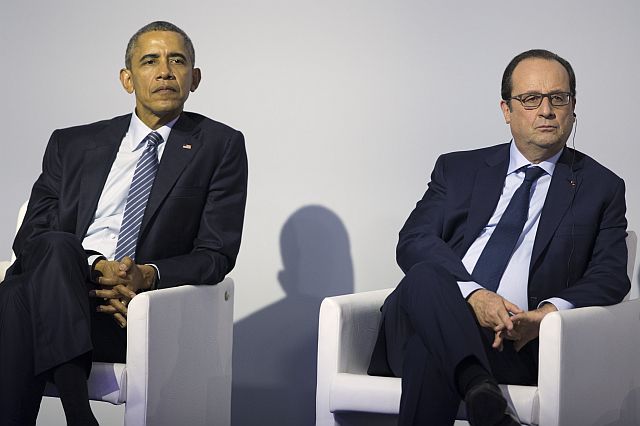
US President Barack Obama (above, left) sits with French President François Hollande during a Mission Innovation event at COP21, United Nations Climate Change Conference, in Le Bourget, outside Paris. (AP PHOTO)
LE BOURGET, France —From deserts encroaching on African farmland to rising sea levels shrinking islands of the South Pacific, leaders of poor nations most affected by climate change are sharing their stories of global warming with leaders of some of the richest on Tuesday.
The encounters — French President François Hollande met African leaders and President Barack Obama was meeting envoys from island nations — highlighted one of the biggest debates among delegates negotiating an international climate agreement: how much rich countries should help poor ones cope or adapt to global warming and reduce their emissions.
On Monday, at an unprecedented gathering of world leaders outside Paris, presidents, prime ministers and princes urged the delegates to build a better planet for future generations. Organizers hope to avoid a repeat of the embarrassing collapse of a similar effort in Copenhagen in 2009 to reach a global climate accord.
On Tuesday, the negotiations began in earnest, with the key task of figuring out who will pay for everything the leaders said needs to be done.
“You have now started the fundamental work,” French Foreign Minister Laurent Fabius told the negotiators. “I implore you to advance on the substance in a way that allows us to respect the strong mandate given by the diverse heads of state and government yesterday.”
At a meeting with Hollande, African leaders described the Sahara Desert encroaching on farmland, forests disappearing from Congo to Madagascar and rising sea levels swallowing homes in West African river deltas.
OBAMA, ENVOYS
Later Tuesday, Obama was meeting envoys from island nations hit hard by rising seas and increasingly violent storms, which scientists attribute to climate change prompted by man-made carbon emissions.
Developing countries say they need financial support and technology to relocate threatened populations and make their own transition to cleaner energy.
On Monday, rich countries announced a new fund to do exactly that, pledging a total of $248 million to it. The Obama administration didn’t specify where its $51 million pledge would come from; Obama has struggled to persuade the Republican-run Congress to fund his climate goals, amid concerns that his energy plan is unattainable.
The talks, which run through Dec. 11, are aimed at a broader, tougher replacement to the 1997 Kyoto Protocol. That treaty required only rich countries to cut their emissions, while this time the goal is for everyone to pitch in.
One of the proposals involves saving the world’s forests, which absorb carbon dioxide released by burning oil, gas and coal.
Disclaimer: The comments uploaded on this site do not necessarily represent or reflect the views of management and owner of Cebudailynews. We reserve the right to exclude comments that we deem to be inconsistent with our editorial standards.
